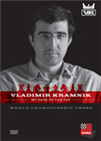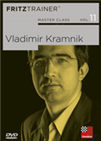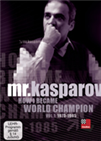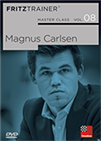"I never expected to achieve that much..."
This is a wonderful interview and portrait that appeared in the South Indian magazine New Sunday Express. It was conducted by Ashok Venugopal after former World Champion Vladimir Kramnik surprised followers the world over by announcing retirement. The Sunday Express writes:
A giant of the game during his time and among the all-time greats, the Russian was famous for his association with the legendary Garry Kasparov, whom he helped during [Kasparov's] reign as World Champion and beat in a championship match. In an exclusive interview Kramnik says he has lost the hunger to compete. He treasures his friendship with Viswanathan Anand, follows Indian chess and believes the country is a powerhouse of talented players. He foresees another Indian World Champion in the near future. "You have a golden generation in India now, with several highly talented kids. All of them can become in the near future one of or the best in the world. I know them all by their names and saw their games too. I sincerely believe India will become a chess superpower in a few years. I have no doubt about it."
Kramnik adds that he is spiritually inclined towards India and wants to interact with talented players there. Here are some more points that came up in the interview:
-
Was he satisfied with his career on the whole? Kramnik: "I never expected to achieve that much, still wondering how I managed to do it. So definitely yes. It was satisfying."
-
How he was able to beat Garry Kasparov in a match: "No idea, I simply wanted to give my best against the greatest opponent at that time, and see what happens. Did not expect that my best would be enough to win. So after that match I realised that we all are capable of more that what we can really imagine."
-
His memories of Anand (against whom he has a lifetime score of +11, =71, –11): "The sharpest memory is of course that our first game in Moscow in 1989 ended in a draw. The fast playing Indian was already very impressive by then, much more than the boy in shorts opposite him! Pity no one took a photo of us playing that day. I would have given a lot to look at it 30 years later."
-
On Magnus Carlsen and the qualities which make him special: "Great talent, nerve system and 100% focus on chess. Very competitive by nature and with the flush of youth. So, more or less, he has everything you need to be a good chess player."
-
On chess engines: "They have pluses and minuses. For professionals more minuses, for chess lovers more pluses, that is my opinion."
- On his post-retirement plans: "To live happily, the rest will follow."
 On this DVD Vladimir Kramnik retraces his career from talented schoolboy to World Champion in 2006. With humour and charm he describes his first successes, what it meant to be part of the Russian Gold Medal team at the Olympiad, and how he undertook the Herculean task of beating his former mentor and teacher Garry Kasparov.
On this DVD Vladimir Kramnik retraces his career from talented schoolboy to World Champion in 2006. With humour and charm he describes his first successes, what it meant to be part of the Russian Gold Medal team at the Olympiad, and how he undertook the Herculean task of beating his former mentor and teacher Garry Kasparov.

Read the full interview on the New Indian Express news page.
On a personal note
In his Sunday Express interview Kramnik says that Kasparov had been rating him (too) highly since his younger days. "He saw the spark of a quality player in me when I was just 17," says Kramnik, "and he publicly said that I had the potential to be a world champion."
Actually he started doing this a year earlier, Vlady — I [Frederic Friedel] can confirm that with a little personal story. On April 19th, 1992, I travelled to Dortmund for a giant GM tournament in which both my chess friends Kasparov and Anand were playing. The games took place in a square stage in the middle of a giant hall, with spectators seated in stands all around, much like a boxing match. I arrived after round three had started, and quietly took a seat somewhere near the back. But Garry saw me enter. He did not wave or nod, but walked over to his wife in the front row and whispered something to her. She got up and came to me, took me by the hand and led me out of the hall. All this, incidentally, was reported in a local newspaper the next day, with speculation on what Kasparov may have instructed us to do.
 Here's what actually happened: Garry's wife led me to the basement of the venue, where the big Open was being played. She walked me through the rows of players, reading the name cards as she did so. In a remote corner she at last found what she was looking for: "That's him!" she said.
Here's what actually happened: Garry's wife led me to the basement of the venue, where the big Open was being played. She walked me through the rows of players, reading the name cards as she did so. In a remote corner she at last found what she was looking for: "That's him!" she said.
"That's who?" I asked. "Kramnik!" she replied.
"And why are you showing him to me?"
"Because Garry told me to."
The picture on the left was taken (by me) a year later, in Dortmund. It is very similar to the lad I saw playing in the Open in 1992.
Garry was in a foul mood after the game, which he had lost to Gata Kamsky. At dinner, when he had calmed down, I asked him: "Why did you want me to see Kramkin?"
"Kramnik," he corrected. "He is just sixteen but already very, very strong. And very deep. Keep an eye on him, he will go all the way to the top."
 I registered that. Later in the year I heard from a friend in the Soviet Union, Alexander Roshal, that Kasparov was being very difficult about the Chess Olympiad in Manilla. "He wants the kid Kramnik to be part of the team," Roshal said. "They told him there are a dozen more senior GMs, but he said then they should put one of them on the first board — meaning he would not play if they did not include Kramnik. In the end they put Vladimir on the team. This is very risky. He is not even an IM!"
I registered that. Later in the year I heard from a friend in the Soviet Union, Alexander Roshal, that Kasparov was being very difficult about the Chess Olympiad in Manilla. "He wants the kid Kramnik to be part of the team," Roshal said. "They told him there are a dozen more senior GMs, but he said then they should put one of them on the first board — meaning he would not play if they did not include Kramnik. In the end they put Vladimir on the team. This is very risky. He is not even an IM!"
The picture on the right shows FM Vladimir Kramnik pacing up and down the stage of the 1992 Manila Olympiad. It was taken on or close to his 17th birthday — during his stunning international debut. Here are his individual results against world-class players, and his over-all performance, as recorded by OlimpBase:
 This DVD allows you to learn from the example of one of the best players in the history of chess and from the explanations of the authors (Pelletier, Marin, Müller and Reeh) how to successfully organise your games strategically, consequently how to keep y
This DVD allows you to learn from the example of one of the best players in the history of chess and from the explanations of the authors (Pelletier, Marin, Müller and Reeh) how to successfully organise your games strategically, consequently how to keep y
In his Sunday Express interview, Ashok Venugopal asked Kramnik about his recollections of the Olympiad. Vladimir answers:
"As most of good performances I had in my career, I could not believe and understand how I managed it. At times, I used to ponder why opponents are playing as if they forgot everything they had learned in their childhood about chess. The thought that maybe I was already quite strong at that moment came years after."
I narrate this to document Kasparov's uncanny ability to spot chess genius. Two more examples: some years before the above episode with Kramnik, Garry was in Hamburg. There was a press conference, and one of the questions asked was: "Who are the most promising chess talents around, who do you expect to make it to the top." Garry thought and shrugged — not an easy question (Anand and Kramnik had not yet surfaced). The journalists insisted and at last Garry said: "Well, maybe Gata Kamsky..."
 Garry Kasparov's rise to the top was meteoric and at his very first attempt he managed to become World Champion, the youngest of all time. In over six hours of video, he gives a first hand account of crucial events from recent chess history, you can improve your chess understanding and enjoy explanations and comments from a unique and outstanding personality on and off the chess board.
Garry Kasparov's rise to the top was meteoric and at his very first attempt he managed to become World Champion, the youngest of all time. In over six hours of video, he gives a first hand account of crucial events from recent chess history, you can improve your chess understanding and enjoy explanations and comments from a unique and outstanding personality on and off the chess board. "Gata Kamsky?" we all asked. "Who is Gata Kamsky?" Garry told us he was a young boy of Tatar extraction who was "very talented." Everybody started to look for Kamsky, and a month later our data manager (and chess journalist) Gisbert Jacoby found him at a tournament in St. Petersburg. Gisbert approached his coach and told him he wanted to interview the boy.
"Gata Kamsky?" we all asked. "Who is Gata Kamsky?" Garry told us he was a young boy of Tatar extraction who was "very talented." Everybody started to look for Kamsky, and a month later our data manager (and chess journalist) Gisbert Jacoby found him at a tournament in St. Petersburg. Gisbert approached his coach and told him he wanted to interview the boy.
"Sure, no problem," said the coach, "but why?" — "Because Kasparov thinks he is a great talent," Gisbert replied. The coach looked at him in disbelief: "You must be mistaken, Garry Kasparov cannot mean this boy."
The picture on the left is Kamsky some years later — at the 1992 Olympiad in which Gata was playing for the USA, and comes from the collection of the World Chess Hall of Fame. I cannot find any pictures of Gata from the time Kasparov referred to him.
Well Kasparov was right, his instinct and his ability to spot talent had not failed him. Kamsky went on to become one of the world's top players, and a multiple world championship candidate.
A final story: At some stage I was peddling a young player to Garry, who was sceptical about the YAYTs I kept talking about ("Yet Another Young Talent", in case you were wondering). He told me to curb my enthusiasm. "Okay, he's good, but we have to wait and see." Then one day — I was looking after said young player at a tournament — I got a call from Garry. "You know, Fred, maybe you are right, maybe his is really on his way to the top. I was very impressed by today's game."
"But he lost, Garry," I said.
"Yes, yes, but did you see what he was doing? He kept pressing and pressing, full of determination — just like me when I was his age. He is a great talent and definitely going places."
 Scarcely any world champion has managed to captivate chess lovers to the extent Carlsen has. The enormously talented Norwegian hasn't been systematically trained within the structures of a major chess-playing nation such as Russia, the Ukraine or China.
Scarcely any world champion has managed to captivate chess lovers to the extent Carlsen has. The enormously talented Norwegian hasn't been systematically trained within the structures of a major chess-playing nation such as Russia, the Ukraine or China.
A couple of years later Garry ended up training this young boy, who actually did go places...
























